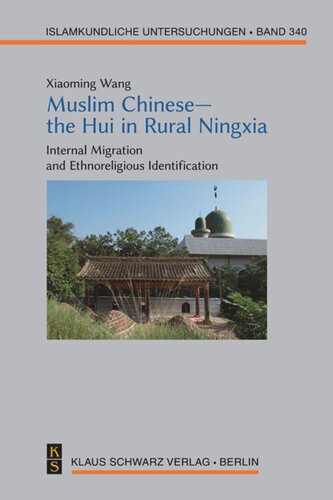

Most ebook files are in PDF format, so you can easily read them using various software such as Foxit Reader or directly on the Google Chrome browser.
Some ebook files are released by publishers in other formats such as .awz, .mobi, .epub, .fb2, etc. You may need to install specific software to read these formats on mobile/PC, such as Calibre.
Please read the tutorial at this link: https://ebookbell.com/faq
We offer FREE conversion to the popular formats you request; however, this may take some time. Therefore, right after payment, please email us, and we will try to provide the service as quickly as possible.
For some exceptional file formats or broken links (if any), please refrain from opening any disputes. Instead, email us first, and we will try to assist within a maximum of 6 hours.
EbookBell Team

4.1
10 reviewsThe Hui are predominantly Muslim Chinese who claim ancestry from Persian and Arabicspeaking regions in Central Asia and the Middle East. According to the 2010 census, the Hui are the largest Muslim group in China and its third largest ethnic minority with a total population of 10.6 million. Due to their extensive geographic distribution and longterm acculturation by the atheist Han majority, the question of Hui identity is rarely raised in humanities and social sciences both in China and abroad. This book examines Hui identity in the rural area of Ningxia Hui Autonomous Region, while taking account of China’s rapid modernisation and industrialisation in the twentyfirst century. Specifically, it focuses on the massive internal migration of rural populations, which has been playing an essential role in the socioeconomic life of Chinese peasants in the past few decades. Based on field data collected between 2011 and 2013 among the Jahriyya Hui, the study seeks to clarify the impacts of migration on the Hui’s ethnoreligious identity by investigating three key issues: the Hui’s purity concept, fasting and their belief in the afterworld. In relation to these reference points, religious rituals, including commemoration ceremonies and the Ramadan fast as well as their changing forms and values, are illustrated and analysed. The thesis shows that Islam continues to play a crucial part in drawing boundaries and maintaining identity for the Hui both before and after migration. However, population movements in Ningxia are resulting in increased interactions between Hui and Han populations as well as between Hui from diverse ›menhuan‹ (Sufi paths). Consequently, the Hui’s unique ›menhuan‹ awareness is being weakened and their purity concept subjected to many queries, doubts, ambiguities, and tensions.